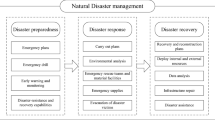Abstract
Typhoon disasters cause serious economic losses and human casualties every year. An accurate evaluation system for typhoon disaster losses is the prerequisite for preventing and reducing the consequences of the disasters. In this chapter, a multi-model system is introduced. Based on the databases of typhoon information, this system establishes a comprehensive evaluation model which is capable of evaluating the possible losses before, during, and after typhoon disasters and automatically generating disaster ranks. Accordingly, a report consisting of disaster losses and coping strategies is proposed by this system. This chapter illustrates the functional framework, the database design, the model construction, the evaluation methods and the generating report of the system. Besides, partial demonstrations and experimental results are also provided.
Access this chapter
Tax calculation will be finalised at checkout
Purchases are for personal use only
Similar content being viewed by others
References
Emanuel, K.A.: The dependence of hurricane intensity on climate. Nature 326(6112), 483–485 (1987)
Guo, J.S., Zhang, F.: An equivalent key attack on an image cryptosystem. Acta Electronica Sin. 38(004), 781–785 (2010)
Hsu, C.C., Hong, Z.Y.: An intelligent typhoon damage prediction system from aerial photographs. Knowledge-Based Intelligent Information and Engineering Systems Lecture Notes in Computer Science, vol. 4692, pp. 747–756 (2007)
Knutson, T.R., Tuleya, R.E., Kurihara, Y.: Simulated increase of hurricane intensities in a CO2-warmed climate. Science 279(5353), 1018 (1998)
Liu, S.J., Zhang, J.H., He, Z.W., Cai, D.X., Tian, G.H.: Study on assessment model of typhoon disaster losses based on GIS. J. Catastrophology 25(002), 64–67 (2010)
Lou, W.P., Chen, H.Y., Zheng, F., Chen, R.: Economic loss assessment of typhoon based on principal component analysis and neural network. Geogr. Res. 28(5), 1243–1254 (2009)
Luü, C.L., Chen, S.H.: Multiple linear interdependent models (MLIM) applied to typhoon data from China. Theor. Appl. Climatol. 61(3), 143–149 (1998)
Okazaki, T., Watabe, H., Ishihara, T.: Development of typhoon simulation model for insurance risk estimation. Wind Eng. 12–14, 1790–1802 (2005)
Shi, Y.G., Kou, Y.Y., Li, G.X., Wang, Y., Peng, Y., Shi, Y.: A Fuzzy Multi-Criteria Decision-Making Hybrid Approach to Evaluate the Damage Level of Typhoon: Integration of fuzzy AHP and fuzzy TOPSIS, IEEE, pp. 666–671 (2010)
Sun, S.C.: A study on the contents and methods of disaster assessment. Prog. Geogr. 20(002), 122–130 (2001)
Wu, H., Chen, D.M., Wu, S.A., Wu, C.K.: Application of grey relation analysis for evaluation of tropical cyclone disaster. Chin. J. Trop. Crops 30(2), 244–248 (2009)
Zhang, X.C., Lou, W.P.: Support vector machine based on principal component of the number of typhoons between the assessment of houses collapsed. J. Anhui Agric. Sci. 012, 6339–6341 (2010)
Zhao, A.X., Ma, Z.J.: Appraising study for the loss evaluation system of natural disasters. J. Nat. Disasters 2(3), 1–7 (1993)
Acknowledgments
This research was supported by: (1) Guangdong Natural Science Foundation Team Research Project, China, “Hazard Evaluation on Typhoons and Examination on Their Biological Effect in the South China Coastal Area Based on Satellite Remote Sensing” (8351030101000002). (2) Science and Technology Planning Project of Guangdong Province, China, “Development of Emergency Response System of Major Typhoon Disaster and Urban Fire Disaster” (2010B031900041). (3) Science and Technology Planning Project of Guangdong Province, China, “Research on Real Classification System of Peer-to-Peer Network Traffic based on Machine Learning Method” (2009B080701031).
Author information
Authors and Affiliations
Corresponding author
Editor information
Editors and Affiliations
Rights and permissions
Copyright information
© 2014 Springer-Verlag Berlin Heidelberg
About this chapter
Cite this chapter
Yang, A., Sui, G., Tang, D., Chen, H., Lin, J. (2014). A Typhoon Disaster Loss Evaluation System Based on Multi-models. In: Tang, D., Sui, G. (eds) Typhoon Impact and Crisis Management. Advances in Natural and Technological Hazards Research, vol 40. Springer, Berlin, Heidelberg. https://doi.org/10.1007/978-3-642-40695-9_26
Download citation
DOI: https://doi.org/10.1007/978-3-642-40695-9_26
Published:
Publisher Name: Springer, Berlin, Heidelberg
Print ISBN: 978-3-642-40694-2
Online ISBN: 978-3-642-40695-9
eBook Packages: Earth and Environmental ScienceEarth and Environmental Science (R0)




